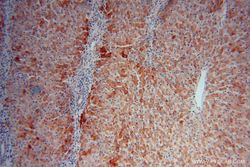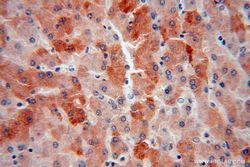Antibody data
- Antibody Data
- Antigen structure
- References [12]
- Comments [0]
- Validations
- Western blot [1]
- Immunohistochemistry [2]
Submit
Validation data
Reference
Comment
Report error
- Product number
- 16910-1-AP - Provider product page

- Provider
- Proteintech Group
- Proper citation
- Proteintech Cat#16910-1-AP, RRID:AB_2300207
- Product name
- PROS1 antibody
- Antibody type
- Polyclonal
- Description
- PROS1 antibody (Cat. #16910-1-AP) is a rabbit polyclonal antibody that shows reactivity with human, mouse and has been validated for the following applications: IF, IHC, WB,ELISA.
- Reactivity
- Human, Mouse
- Host
- Rabbit
- Conjugate
- Unconjugated
- Isotype
- IgG
- Vial size
- 20ul, 150ul
Submitted references Extracellular vesicle biomarkers for complement dysfunction in schizophrenia.
A single cell atlas of frozen shoulder capsule identifies features associated with inflammatory fibrosis resolution.
Screening cell-cell communication in spatial transcriptomics via collective optimal transport.
PROS1, a clinical prognostic biomarker and tumor suppressor, is associated with immune cell infiltration in breast cancer: A bioinformatics analysis combined with experimental verification.
Multisample Mass Spectrometry-Based Approach for Discovering Injury Markers in Chronic Kidney Disease.
CeRNA regulatory network-based analysis to study the roles of noncoding RNAs in the pathogenesis of intrahepatic cholangiocellular carcinoma.
The malaria parasite Plasmodium falciparum in red blood cells selectively takes up serum proteins that affect host pathogenicity.
Proteomic and Metabolomic Analyses of Vanishing White Matter Mouse Astrocytes Reveal Deregulation of ER Functions.
The TAM family receptor tyrosine kinase TYRO3 is a negative regulator of type 2 immunity.
Hereditary protein S deficiency leads to ischemic stroke.
Molecular basis of protein S deficiency in China.
Upregulation of anticoagulant proteins, protein S and tissue factor pathway inhibitor, in the mouse myocardium with cardio-specific TNF-α overexpression.
Xue T, Liu W, Wang L, Shi Y, Hu Y, Yang J, Li G, Huang H, Cui D
Brain : a journal of neurology 2024 Mar 1;147(3):1075-1086
Brain : a journal of neurology 2024 Mar 1;147(3):1075-1086
A single cell atlas of frozen shoulder capsule identifies features associated with inflammatory fibrosis resolution.
Ng MTH, Borst R, Gacaferi H, Davidson S, Ackerman JE, Johnson PA, Machado CC, Reekie I, Attar M, Windell D, Kurowska-Stolarska M, MacDonald L, Alivernini S, Garvilles M, Jansen K, Bhalla A, Lee A, Charlesworth J, Chowdhury R, Klenerman P, Powell K, Hackstein CP, ICECAP Consortium, Furniss D, Rees J, Gilroy D, Coles M, Carr AJ, Sansom SN, Buckley CD, Dakin SG
Nature communications 2024 Feb 19;15(1):1394
Nature communications 2024 Feb 19;15(1):1394
Screening cell-cell communication in spatial transcriptomics via collective optimal transport.
Cang Z, Zhao Y, Almet AA, Stabell A, Ramos R, Plikus MV, Atwood SX, Nie Q
Nature methods 2023 Feb;20(2):218-228
Nature methods 2023 Feb;20(2):218-228
PROS1, a clinical prognostic biomarker and tumor suppressor, is associated with immune cell infiltration in breast cancer: A bioinformatics analysis combined with experimental verification.
He T, Sun X, Wu C, Yao L, Zhang Y, Liu S, Jiang Y, Li Y, Wang M, Xu Y
Cellular signalling 2023 Dec;112:110918
Cellular signalling 2023 Dec;112:110918
Multisample Mass Spectrometry-Based Approach for Discovering Injury Markers in Chronic Kidney Disease.
Kim JE, Han D, Jeong JS, Moon JJ, Moon HK, Lee S, Kim YC, Yoo KD, Lee JW, Kim DK, Kwon YJ, Kim YS, Yang SH
Molecular & cellular proteomics : MCP 2021;20:100037
Molecular & cellular proteomics : MCP 2021;20:100037
CeRNA regulatory network-based analysis to study the roles of noncoding RNAs in the pathogenesis of intrahepatic cholangiocellular carcinoma.
Xu W, Yu S, Xiong J, Long J, Zheng Y, Sang X
Aging 2020 Jan 17;12(2):1047-1086
Aging 2020 Jan 17;12(2):1047-1086
The malaria parasite Plasmodium falciparum in red blood cells selectively takes up serum proteins that affect host pathogenicity.
Tougan T, Edula JR, Morita M, Takashima E, Honma H, Tsuboi T, Horii T
Malaria journal 2020 Apr 15;19(1):155
Malaria journal 2020 Apr 15;19(1):155
Proteomic and Metabolomic Analyses of Vanishing White Matter Mouse Astrocytes Reveal Deregulation of ER Functions.
Wisse LE, Penning R, Zaal EA, van Berkel CGM, Ter Braak TJ, Polder E, Kenney JW, Proud CG, Berkers CR, Altelaar MAF, Speijer D, van der Knaap MS, Abbink TEM
Frontiers in cellular neuroscience 2017;11:411
Frontiers in cellular neuroscience 2017;11:411
The TAM family receptor tyrosine kinase TYRO3 is a negative regulator of type 2 immunity.
Chan PY, Carrera Silva EA, De Kouchkovsky D, Joannas LD, Hao L, Hu D, Huntsman S, Eng C, Licona-Limón P, Weinstein JS, Herbert DR, Craft JE, Flavell RA, Repetto S, Correale J, Burchard EG, Torgerson DG, Ghosh S, Rothlin CV
Science (New York, N.Y.) 2016 Apr 1;352(6281):99-103
Science (New York, N.Y.) 2016 Apr 1;352(6281):99-103
Hereditary protein S deficiency leads to ischemic stroke.
Wang ZH, Zhao ZJ, Xu K, Sun GB, Song L, Yin HX, Chen XQ
Molecular medicine reports 2015 Sep;12(3):3279-3284
Molecular medicine reports 2015 Sep;12(3):3279-3284
Molecular basis of protein S deficiency in China.
Tang L, Jian XR, Hamasaki N, Guo T, Wang HF, Lu X, Wang QY, Hu Y
American journal of hematology 2013 Oct;88(10):899-905
American journal of hematology 2013 Oct;88(10):899-905
Upregulation of anticoagulant proteins, protein S and tissue factor pathway inhibitor, in the mouse myocardium with cardio-specific TNF-α overexpression.
Higuchi Y, Kubota T, Koyanagi M, Maeda T, Feldman AM, Makino N
American journal of physiology. Heart and circulatory physiology 2012 Jun 1;302(11):H2352-62
American journal of physiology. Heart and circulatory physiology 2012 Jun 1;302(11):H2352-62
No comments: Submit comment
Supportive validation
- Submitted by
- Proteintech Group (provider)
- Main image

- Experimental details
- human placenta tissue were subjected to SDS PAGE followed by western blot with 16910-1-AP(PROS1 antibody) at dilution of 1:1000
- Sample type
- tissue
Supportive validation
- Submitted by
- Proteintech Group (provider)
- Main image

- Experimental details
- Immunohistochemical of paraffin-embedded human liver using 16910-1-AP(PROS1 antibody) at dilution of 1:100 (under 10x lens)
- Sample type
- tissue
- Submitted by
- Proteintech Group (provider)
- Main image

- Experimental details
- The PROS1 antibody from Proteintech is a rabbit polyclonal antibody to a recombinant protein of human PROS1. This antibody recognizes human,mouse,rat antigen. The PROS1 antibody has been validated for the following applications: ELISA, WB, IHC analysis.
 Explore
Explore Validate
Validate Learn
Learn Western blot
Western blot ELISA
ELISA